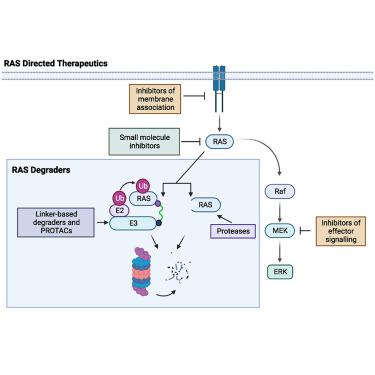Molecular Therapy ( IF 12.1 ) Pub Date : 2023-03-21 , DOI: 10.1016/j.ymthe.2023.03.017 Taylor E Escher 1 , Karla J F Satchell 1

|
The function and significance of RAS proteins in cancer have been widely studied for decades. In 2013, the National Cancer Institute established the RAS Initiative to explore innovative approaches for attacking the proteins encoded by mutant forms of RAS genes and to create effective therapies for RAS-driven cancers. This initiative spurred researchers to develop novel approaches and to discover small molecules targeting this protein that was at one time termed “undruggable.” More recently, advanced efforts in RAS degraders including PROTACs, linker-based degraders, and direct proteolysis degraders have been explored as novel strategies to target RAS for cancer treatment. These RAS degraders present new opportunities for RAS therapies and may prove fruitful in understanding basic cell biology. Novel delivery strategies will further enhance the efficacy of these therapeutics. In this review, we summarize recent efforts to develop RAS degraders, including PROTACs and E3 adaptor and ligase fusions as cancer therapies. This review also details the direct RAS protease degrader, RAS/RAP1-specific endopeptidase that directly and specifically cleaves RAS.
中文翻译:

RAS 降解剂:RAS 驱动的癌症的新领域
数十年来,RAS 蛋白在癌症中的功能和意义已被广泛研究。 2013 年,美国国家癌症研究所建立了 RAS 计划,旨在探索攻击RAS基因突变形式编码的蛋白质的创新方法,并为RAS驱动的癌症创造有效的疗法。这一举措促使研究人员开发新方法,并发现针对这种一度被称为“不可成药”的蛋白质的小分子。最近,RAS 降解剂(包括 PROTAC、基于连接体的降解剂和直接蛋白水解降解剂)方面的进展已被探索作为针对 RAS 进行癌症治疗的新策略。这些 RAS 降解剂为 RAS 治疗提供了新的机会,并可能在理解基础细胞生物学方面取得丰硕成果。新颖的递送策略将进一步增强这些疗法的功效。在这篇综述中,我们总结了最近开发 RAS 降解剂的努力,包括 PROTAC 和 E3 接头以及连接酶融合作为癌症疗法。该综述还详细介绍了直接 RAS 蛋白酶降解剂,即直接、特异性裂解 RAS 的 RAS/RAP1 特异性内肽酶。































 京公网安备 11010802027423号
京公网安备 11010802027423号